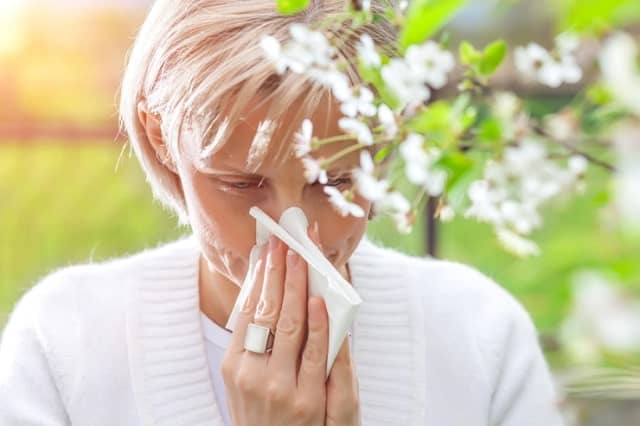CBD for Seasonal Allergies: Are you tired of popping antihistamines every allergy season? Well, there might be a new solution in town. CBD, a compound found in the cannabis plant, has shown promising results in managing seasonal allergies. In this article, we will delve into the science behind CBD and allergies, its potential benefits, and how to use it safely.
Table of Contents
Seasonal allergies affect millions of people every year. Sneezing, watery eyes, and itchy nose are some of the most common symptoms of allergies. While over-the-counter antihistamines can help alleviate the symptoms, they often come with side effects like drowsiness, dry mouth, and dizziness. This is where CBD comes in as a potential alternative. CBD, or cannabidiol, is a non-psychoactive compound found in the cannabis plant that is known for its anti-inflammatory properties. In recent years, CBD has gained popularity as a natural remedy for a variety of ailments, including allergies.
What is CBD, and how does it work?
CBD is one of the many cannabinoids found in the cannabis plant. Unlike THC, another well-known cannabinoid, CBD does not produce a “high” feeling. CBD interacts with the body’s endocannabinoid system (ECS), which plays a crucial role in regulating various physiological processes, including the immune system. The ECS consists of receptors and neurotransmitters that help maintain balance in the body.
When we encounter allergens like pollen or pet dander, our immune system overreacts and produces histamines, which cause the allergic symptoms we experience. CBD works by suppressing the release of histamines and other pro-inflammatory cytokines, which reduces the severity of allergy symptoms. Additionally, CBD has been found to have antioxidant properties, which can help protect the body against oxidative stress caused by allergies.
Benefits of Using CBD for Seasonal Allergies
One of the main benefits of using CBD for seasonal allergies is that it can help alleviate the symptoms without causing side effects like drowsiness or dry mouth. This is especially important for people who need to be alert and focused during the day. Additionally, CBD has been found to have a broader range of benefits for overall health and well-being, including reducing anxiety and improving sleep quality. Since allergies can sometimes lead to anxiety and sleep disturbances, CBD may help address these issues as well.
Another benefit of using CBD for seasonal allergies is that it can be administered in various forms, such as CBD oils, CBD capsules, CBD tinctures, and CBD topical creams. This allows for more flexibility in dosage and delivery method, making it easier to find the best option that works for you.

How to use CBD safely for seasonal allergies
If you are considering using CBD for seasonal allergies, it is essential to do so safely. Here are some tips to keep in mind:
- Choose high-quality CBD products: Not all CBD products are created equal. Look for products that have been tested by a third-party lab to ensure that they are free of contaminants and have the correct potency.
- Start with a low dose: It’s best to start with a low dose of CBD and gradually increase it as needed. This will help you avoid any potential side effects and ensure that you find the right dose for your needs.
- Be consistent: CBD works best when used consistently, so it’s important to stick to a regular dosing schedule to see the best results.
CBD for Seasonal Allergies: Conclusion
CBD is a promising natural remedy for managing seasonal allergies. Its anti-inflammatory and antioxidant properties may help alleviate symptoms like sneezing, itching, and watery eyes without causing side effects. While more research is needed to confirm CBD’s effectiveness for allergies, many people have reported positive experiences with using CBD.
Choose a high-quality CBD product from a reputable source and start with a low dose, gradually increasing it as needed. With consistency and safe usage, CBD may offer a natural solution for seasonal allergies without the side effects of traditional antihistamines.
In conclusion, CBD may be a promising alternative to traditional antihistamines for managing seasonal allergies. With its anti-inflammatory and antioxidant properties, it may provide relief without the side effects of drowsiness and dry mouth. If you’re interested in trying CBD for allergies, be sure to use a high-quality product safely and consistently.



